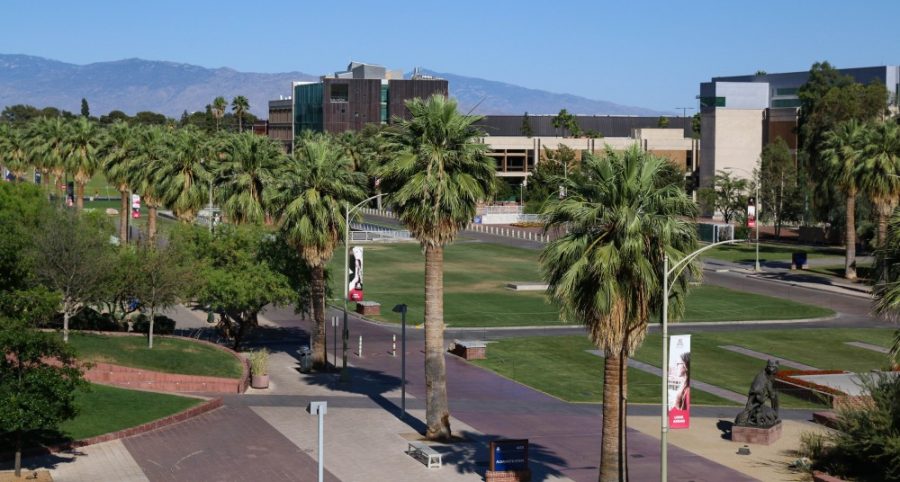Dr. John Sexton gave a talk Monday, March 2, at the University of Arizona on the necessity of the global university in the 21st century, followed by a Q&A with University President Dr. Robert C. Robbins and Vice Provost for Global Affairs Brent White.
Sexton served as dean of New York University Law School from 1988 to 2002 before becoming President of New York University for 15 years, from 2002-2015. His book, “Standing for Reason: The University in a Dogmatic Age,” is a collection of biographical stories interwoven with arguments for “secular ecumenism.” His talk Monday night followed a similar format.
Sexton introduced Monday night’s presentation by discussing his childhood education at the Jesuit Brooklyn Preparatory School, during which he had prominent anti-war activist Father Daniel Berrigan as a teacher.
He recalled Berrigan teaching the Church doctrine of extra ecclesiam nulla salus, meaning “outside the Church there is no salvation,” which Sexton had viewed as an exclusivist philosophy. He contrasted this teaching with his time learning under Charles Winans, who The New York Sun described as a “less-than-orthodox” teacher.
Winans, according to Sexton, emphasized the importance of global experience. He introduced all the different cultures, histories and ideas of the world to Sexton. The teachings of Winans, along with the occurrence of Vatican II during the early ’60s, encouraged Sexton to “think ecumenically.”
Sixty years later, Sexton would be present during the first-ever visit of a Pope to the Arabian Peninsula.
RELATED: Students assist in refugee resettlement through Refugee Project
American politics, according to Sexton, have followed an opposite evolution. He suggested that we are now in a period of triumphalism, ruled by a “virulent secular dogmatism.” Rather than a clash of multiple perspectives, discourse is ruled by a single accepted doctrine. Dr. Sexton expressed a desire for our politics to become more ecumenical – more universally tolerant – not more dogmatic.
“If we’ve done it for religion,” Sexton said, “… we ought to be able to do it with our politics.”
The role of the university, Sexton continued, was then to facilitate this transition. Recalling his time as the founding member and coach of Brooklyn Prep’s debate club, Sexton described to the audience how participants in competitive debate must prepare both sides of a topic. Debaters wouldn’t find out which viewpoint they would represent until a coin was flipped minutes before the round began.
In a similar vein, Sexton argued that universities must serve as an environment in which viewpoints can clash and the best may arise if best supported by the available facts.
“The traditional university is the last best hope for defense against this allergy to nuance and complexity,” Sexton said.
The desire for universities to foster secular ecumenism is one of the driving forces that inspired Sexton to lead the charge for the “global network university.” During his time as president of NYU, Sexton oversaw the openings of NYU Abu Dhabi in 2010 and NYU Shanghai in 2012.
During the Q&A portion of Monday night’s presentation, Sexton explained to Robbins that NYU plans to have over 2,000 students at both of the aforementioned satellite campuses, which will consist of individuals ranging from undergraduates to postdoctoral researchers.
NYU has come under fire for choosing authoritarian countries (the United Arab Emirates and China) with questionable human rights records, rather than democracies, as the locations for their satellite campuses.
When asked by Brent White to address this criticism, Sexton responded, “Would we ever compromise, or allow to be comprised, our academic freedom? Absolutely not.”
During a time when universities withstand constant criticism for their growing cost, Sexton’s words on the importance of higher education strike a powerful chord and remind us that our educational institutions are irreplaceable
“Our universities,” Sexton wrote in the conclusion of his book, “the engines of knowledge and stewards of thought, are our hope.”
Follow Kristijan Barnjak on Twitter









